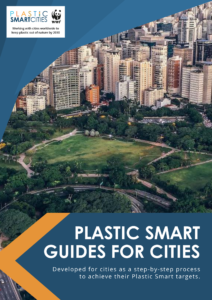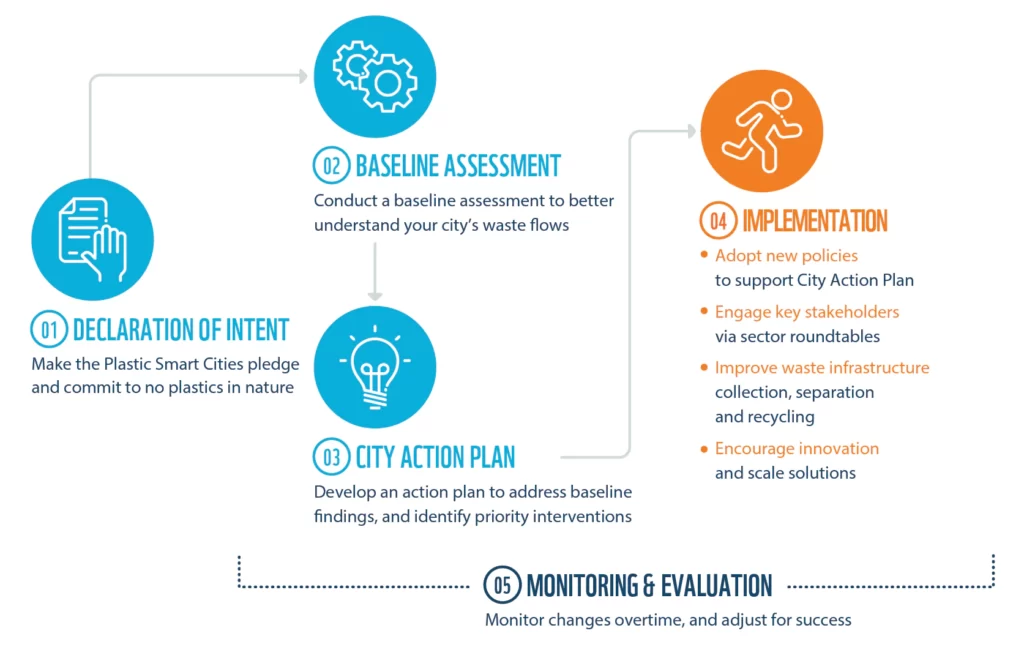Implementation
Get focused on implementing activities designed in the City Action Plan – adopt new policies, engage key stakeholdes, improve waste infrastructure, encourage innovation.
This guidance outlines the implementation of activities described in the City Action Plan. From policy interventions, to improving waste management capacity (collection, separation and recycling infrastructure), to multi-stakeholder processes and citizen engagement, implementation toward specific targets requires careful planning and monitoring and evaluation to assess impact.
The implementation phase should include a pilot project to trial solutions within a designated area, with a goal to reduce plastic pollution by 30% in the pilot area.
There is no one-size-fits-all solution. Rather each city’s unique defining features and situation on the ground must inform the city’s approach. Policy prioritization should also carefully consider the waste hierarchy, with priority on upstream plastic prevention interventions that reduce the volume of plastic waste that must be collected and managed at the local level. These upstream interventions on production and distribution can be complemented by measures that create and support downstream markets and stakeholder interactions that improve waste collection and processing services, strengthen the local recycling sector and transition open dump sites to controlled disposal facilities.
No single policy is capable of ushering in a smooth transition, but a systematic approach that combines measures across the life-cycle of plastic and across all stakeholders in the city can lead to long-term success.
With a host of solutions available to municipal governments, as outlined in Policy Instruments and Best Practices, it is important to establish a process for prioritizing solutions that can effectively address the plastic challenges and baseline conditions existing within the city, as defined in Baseline Assessment.
A blended approach that leverages instruments across the spectrum, to include a mix of Regulatory Instruments, Financial Instruments, Voluntary Instruments, and Education Instruments, and that which combine both upstream and downstream measures, can create incentives that reduce production and consumption of plastics, while also increasing collection and recycling capacities.
But it must be emphasized, that local factors must shape municipal plastic policy. Such factors can include climate, attitudes and expectations of citizens, economic factors, animals, financial planning and purchasing, legislation, and architecture and infrastructure. What works in a European city of 400,000 people, can not be directly exported to a city in Brazil of 4 million people, or to a city of 20 million in China or India.
The living situations and needs of a city’s residents are vital inputs for designing and implementing successful waste policy. Do residents have space at home for 5 bins? Do they live in large apartment buildings or sparse homes in the countryside? Are they a young or ageing population? Such information can provide invaluable inputs that shape policy and public services from waste collection frequency, to source separation requirements and expectations, to willingness-to-pay for collection services.
Building on the local context, proposed solutions can be prioritised at a local level by assessing three key decision points:
- Appropriateness-of-fit
- Ease of Implementation
- Impact
Each key decision point contains important criteria with value levers that can be scored on a relevant scale, allowing for the comparison of different policy options.
Use a simple scoring method to evaluate and support your decision framework – access templates and examples within the Plastic Smart Guide.
(Download PDF below.)
Based on case studies and the existing body of research on plastic solutions , Plastic Smart Cities has categorized the core instruments into three generalized implementation phases: near-term, mid-term and long-term. Though, as outlined in this section, each city’s local situation and influences will ultimately dictate the appropriate prioritizations with consideration for Appropriateness-of-fit, Ease of Implementation, and Impact.
Recommended Phase 1 Actions (near-term)
- Public Awareness – Develop public awareness campaigns in collaboration with business and NGOs, to change the way that plastic is viewed, used and managed as waste. Beach and coastal clean-ups can also increase public awareness and galvanize support across the community.
- Public Procurement – Implement Public procurement policies to give preference to environmentally preferable non-plastic products for city operations and contracts, and to set a model example for stakeholders to follow.
- Municipal Collection – Establish dedicated collection points throughout the city as well door-to-door waste collection capacity.
- Source Segregation – Establish sorting requirements to increase the quality of waste collected at the household or institutional level.
- Sanitary landfills – convert any existing open or uncontrolled dump sites into purpose built sanitary landfills.
- Voluntary Agreements – Establish voluntary agreements as a strategy to move industry, businesses and citizens towards more sustainable alternatives.
- Public-Private Partnerships – Establish strategic partnerships that encourage businesses to make firm commitments on plastic towards transformative business models.
- Municipal Unions – Establish collective unions with neighboring municipalities to pool resources and increase capacity for collection and processing, as well as communal interventions in shared waterways, such as trash booms and racks in rivers and storm drains.
Recommended Phase 2 Actions (Mid-term)
- Bans on single-use plastics
- Pay as you Throw – Charge fees at the local level for waste collection services.
- Advanced Disposal Fees – Levy non-refundable fees on individual products at the point of purchase. The fee is built into the price of the product based on the estimated costs of collection and processing.
- Taxes and Levies – Impose taxes and/or levies on manufacturers, retailers or consumers for use of single-use plastic items to support the transition to reuse systems.
- Blended Financing Instruments – Use public, private or philanthropic capital to increase investment in projects that improve waste management capacities.
- Deposit Refund Schemes – Implement a deposit refund scheme that requires consumers pay a small amount of money when buying plastic products, which can be reimbursed when they bring the container to a collection point after use.
- Product Certifications – Endorse third-party certifications, labels or rankings on products that are plastic-free, contain low volumes of plastics, or are composed of secondary plastics to help create awareness and drive market differentiation.
Recommended Phase 3 Actions (long-term)
- Extended Product Responsibility (EPR) – Collaborate with national authorities to leverage EPR financial resources to fund local collection and waste processing.
- Packaging Material Fees – Collaborate with national authorities to leverage pooled fees to fund packaging waste management activities.
- Municipal Bonds – Issue municipal bonds to finance capital expenditures for waste management facilities and services.
- Landfill taxes – Charge taxes on private landfill operators to help drive waste away from landfill towards preferable disposal alternatives, such as composting, recycling, and reuse.
- Plastic Credit Systems – Establish a system that requires producers to meet specified obligations and purchase recycling certificates based on the amount of plastic waste recycled.
[1] Measuring Urban Development and City Performance, Jasmina Mavrič and Vito Bobek, 2014
Plastic Smart Cities Framework
Follow the journey to becoming a Plastic Smart City.
Click on the steps below find out more about other steps in the framework.
Access the Plastic Smart Guide for Cities
Focused on how cities and local governments can start their journey on becoming plastic smart – complete with templates, actionable recommendations, as well as both framework and examples. Submit your information to access the Plastic Smart Guide.

